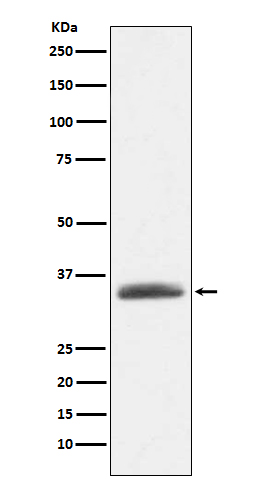AMBP Rabbit mAb
- 产品详情
- 实验流程
Application
| WB, IHC-P |
|---|---|
| Primary Accession | P02760 |
| Reactivity | Human |
| Host | Rabbit |
| Clonality | Monoclonal Antibody |
| Isotype | IgG |
| Conjugate | Unconjugated |
| Immunogen | A synthesized peptide derived from human AMBP |
| Purification | Affinity Chromatography |
| Calculated MW | 38999 Da |
| Gene ID | 259 |
|---|---|
| Other Names | AMBP |
| Dilution | WB~~1/500-1/1000 IHC-P~~1:50~200 |
| Format | Liquid in 10mM PBS, pH 7.4, 150mM sodium chloride, 0.05% BSA, 0.02% sodium azide and 50% glycerol. |
| Storage | Store at 4°C short term. Aliquot and store at -20°C long term. Avoid freeze/thaw cycles. |
| Name | AMBP |
|---|---|
| Synonyms | HCP, ITIL |
| Function | [Alpha-1-microglobulin]: Antioxidant and tissue repair protein with reductase, heme-binding and radical-scavenging activities. Removes and protects against harmful oxidants and repairs macromolecules in intravascular and extravascular spaces and in intracellular compartments (PubMed:11877257, PubMed:15683711, PubMed:22096585, PubMed:23157686, PubMed:23642167, PubMed:25698971, PubMed:32092412, PubMed:32823731). Intravascularly, plays a regulatory role in red cell homeostasis by preventing heme- and reactive oxygen species-induced cell damage. Binds and degrades free heme to protect fetal and adult red blood cells from hemolysis (PubMed:11877257, PubMed:32092412). Reduces extracellular methemoglobin, a Fe3+ (ferric) form of hemoglobin that cannot bind oxygen, back to the Fe2+ (ferrous) form deoxyhemoglobin, which has oxygen-carrying potential (PubMed:15683711). Upon acute inflammation, inhibits oxidation of low- density lipoprotein particles by MPO and limits vascular damage (PubMed:25698971). Extravascularly, protects from oxidation products formed on extracellular matrix structures and cell membranes. Catalyzes the reduction of carbonyl groups on oxidized collagen fibers and preserves cellular and extracellular matrix ultrastructures (PubMed:22096585, PubMed:23642167). Importantly, counteracts the oxidative damage at blood-placenta interface, preventing leakage of free fetal hemoglobin into the maternal circulation (PubMed:21356557). Intracellularly, has a role in maintaining mitochondrial redox homeostasis. Bound to complex I of the respiratory chain of mitochondria, may scavenge free radicals and preserve mitochondrial ATP synthesis. Protects renal tubule epithelial cells from heme-induced oxidative damage to mitochondria (PubMed:23157686, PubMed:32823731). Reduces cytochrome c from Fe3+ (ferric) to the Fe2+ (ferrous) state through formation of superoxide anion radicals in the presence of ascorbate or NADH/NADPH electron donor cofactors, ascorbate being the preferred cofactor (PubMed:15683711). Has a chaperone role in facilitating the correct folding of bikunin in the endoplasmic reticulum compartment (By similarity). |
| Cellular Location | [Alpha-1-microglobulin]: Secreted. Endoplasmic reticulum. Cytoplasm, cytosol. Cell membrane; Peripheral membrane protein. Nucleus membrane; Peripheral membrane protein. Mitochondrion inner membrane; Peripheral membrane protein. Secreted, extracellular space, extracellular matrix. Note=The cellular uptake occurs via a non-endocytotic pathway and allows for localization to various membrane structures. A specific binding to plasma membrane suggests the presence of a cell receptor, yet to be identified Directly binds collagen fibers type I. |
| Tissue Location | [Alpha-1-microglobulin]: Expressed by the liver and secreted in plasma. Occurs in many physiological fluids including plasma, urine, and cerebrospinal fluid (PubMed:11877257). Expressed in epidermal keratinocytes, in dermis and epidermal-dermal junction (at protein level) (PubMed:22096585). Expressed in red blood cells (at protein level) (PubMed:32092412). Expressed in placenta (PubMed:21356557). |
Research Areas
For Research Use Only. Not For Use In Diagnostic Procedures.
Application Protocols
Provided below are standard protocols that you may find useful for product applications.
终于等到您。ABCEPTA(百远生物)抗体产品。
点击下方“我要评价 ”按钮提交您的反馈信息,您的反馈和评价是我们最宝贵的财富之一,
我们将在1-3个工作日内处理您的反馈信息。
如有疑问,联系:0512-88856768 tech-china@abcepta.com.
¥ 1,500.00
Cat# AP77747























 癌症的基本特征包括细胞增殖、血管生成、迁移、凋亡逃避机制和细胞永生等。找到癌症发生过程中这些通路的关键标记物和对应的抗体用于检测至关重要。
癌症的基本特征包括细胞增殖、血管生成、迁移、凋亡逃避机制和细胞永生等。找到癌症发生过程中这些通路的关键标记物和对应的抗体用于检测至关重要。 为您推荐一个泛素化位点预测神器——泛素化分析工具,可以为您的蛋白的泛素化位点作出预测和评分。
为您推荐一个泛素化位点预测神器——泛素化分析工具,可以为您的蛋白的泛素化位点作出预测和评分。 细胞自噬受体图形绘图工具为你的蛋白的细胞受体结合位点作出预测和评分,识别结合到自噬通路中的蛋白是非常重要的,便于让我们理解自噬在正常生理、病理过程中的作用,如发育、细胞分化、神经退化性疾病、压力条件下、感染和癌症。
细胞自噬受体图形绘图工具为你的蛋白的细胞受体结合位点作出预测和评分,识别结合到自噬通路中的蛋白是非常重要的,便于让我们理解自噬在正常生理、病理过程中的作用,如发育、细胞分化、神经退化性疾病、压力条件下、感染和癌症。






